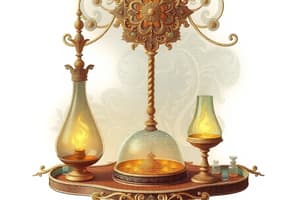Podcast
Questions and Answers
What does Boyle's Law state?
What does Boyle's Law state?
- Volume is directly proportional to pressure.
- Volume is inversely proportional to pressure. (correct)
- Volume does not depend on pressure.
- Pressure remains constant.
What does Charles's Law indicate?
What does Charles's Law indicate?
- Volume is directly proportional to temperature. (correct)
- Volume is unaffected by temperature.
- Temperature impacts the pressure only.
- Volume is inversely proportional to temperature.
What does Gay-Lussac's Law state?
What does Gay-Lussac's Law state?
- Pressure is directly proportional to temperature. (correct)
- Pressure does not depend on temperature.
- Temperature remains constant.
- Pressure is inversely proportional to temperature.
What does the Combined Gas Law relate?
What does the Combined Gas Law relate?
What does Avogadro's Principle state?
What does Avogadro's Principle state?
What is the symbol for the ideal gas constant?
What is the symbol for the ideal gas constant?
What does the Ideal Gas Law describe?
What does the Ideal Gas Law describe?
1 N per square meter is known as a _____
1 N per square meter is known as a _____
Flashcards are hidden until you start studying
Study Notes
Boyle's Law
- States that the volume of a fixed amount of gas is inversely proportional to its pressure when temperature is constant.
Charles's Law
- Describes the direct proportionality between the volume of a fixed amount of gas and its Kelvin temperature at constant pressure.
Gay-Lussac's Law
- Indicates that the pressure of a fixed amount of gas is directly proportional to its Kelvin temperature while maintaining constant volume.
Combined Gas Law
- Merges Boyle's, Charles's, and Gay-Lussac's laws to relate pressure, temperature, and volume in a single equation.
Avogadro's Principle
- Asserts that equal volumes of gases at the same temperature and pressure contain an equal number of particles.
Constant Gas
- Refers to the ideal gas constant (R), determined through experiments measuring pressure, temperature, volume, and the number of moles.
Ideal Gas Law
- Formula that describes the behavior of an ideal gas based on pressure, volume, temperature, and number of moles of gas.
Pascal
- Unit of pressure defined as one newton per square meter (1 N/m²).
Studying That Suits You
Use AI to generate personalized quizzes and flashcards to suit your learning preferences.




